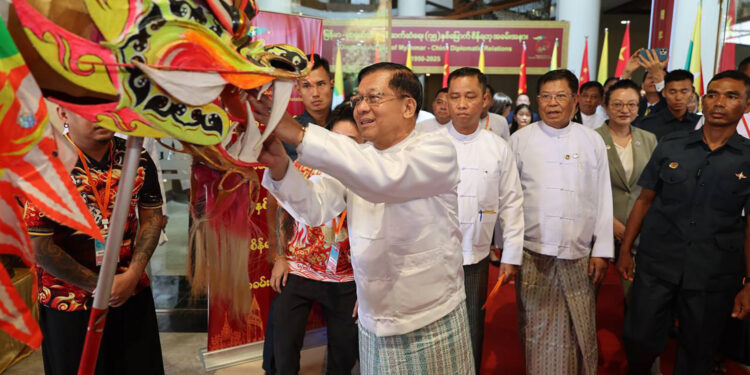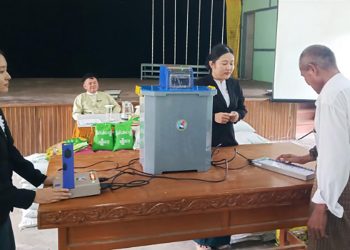Myanmar junta leader Min Aung Hlaing, who has survived international sanctions and internal armed conflict due to China’s support, expressed his gratitude for Beijing’s help in comments to mark the 75th anniversary of Myanmar-China diplomatic relations on Sunday.
As a result of Operation 1027, an anti-junta military offensive launched in 2023 and 2024, the regime has lost control of nearly 90 towns to resistance forces and their allied ethnic armed groups, including two major military commands in northern Shan and Rakhine.
In response to the regime’s setbacks, Chinese Foreign Minister Wang Yi stated that China would support Myanmar’s “internal stability”, assist with the junta’s elections, and oppose foreign interference in Myanmar’s affairs, publicly demonstrating China’s alignment with the junta.
Even before it made its backing for the regime explicit, Beijing was a key arms supplier to the junta and, with Russia, stood by it at the UN.
Meanwhile, under Chinese pressure, ethnic armed groups participating in Operation 1027 have entered peace talks with the junta. A key player in Operation 1027, the Kokang-based Myanmar National Democratic Alliance Army (MNDAA), was forced to hand the northern Shan State capital Lashio—which it had captured—back to the junta. China continues to pressure another Operation 1027 participant, the Ta’ang National Liberation Army (TNLA), to stop fighting the junta. After initially keeping him at arm’s length, Chinese President Xi Jinping even met with Min Aung Hlaing in May, demonstrating China’s strong backing for the junta.
To mark the 75th anniversary of bilateral ties, Min Aung Hlaing emphasized his intention to swiftly implement China’s strategic Belt and Road Initiative (BRI) projects in Myanmar, including those planned under the China-Myanmar Economic Corridor (CMEC). He thanked China for its international support, welcomed Xi’s global development initiatives, and reaffirmed support for the One China Policy. “I would like to express my appreciation and thanks for good-will support and consistent positive engagement of China towards Myanmar. I would also like to thank China for its support for Myanmar affairs in the international frontier,” he said.
In a message, Xi expressed readiness to accelerate BRI implementation with Myanmar, notably through CMEC projects. These encompass the Kyaukphyu deep-sea port on the coast of Rakhine, and railway connections between Rakhine and Yunnan, which are vital to China’s strategic goals of securing access to the Indian Ocean and developing landlocked Yunnan and other southwestern provinces.
Despite Min Aung Hlaing’s promises to expedite CMEC projects, ongoing armed conflicts in northern Shan and fighting between the Arakan Army and the junta in Kyaukphyu, where Chinese projects are located, pose challenges.
Before establishing diplomatic ties on June 8, 1950, Myanmar was the first country to recognize communist China. Myanmar fully supported China’s UN membership, fostering a historically close relationship.
Seventy-five years later, however, Min Aung Hlaing is criticized as a puppet leader, bending to China’s will to maintain power and allowing himself to be manipulated by Beijing.
In addition to vowing to promote China’s infrastructure plans, his regime recently enacted a private security law to allow Chinese armed personnel to protect Chinese interests in Myanmar, and has joined China’s crackdown on cybercrime, proclaiming it a “national duty”.

















